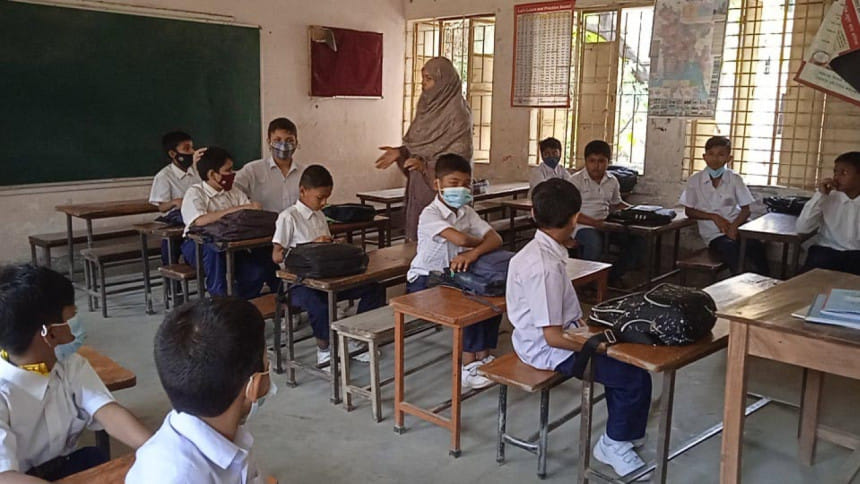Fewer school students attend in-person classes

"We have to work at the grassroots level to bring back the victims of child marriage. We have started training 200,000 teachers to work on mental health."
About one-third of secondary students and one-fifth of primary students remained absent from schools as educational institutions resumed in-person classes after Covid-induced closure.
A campaign titled "Safe Back to School", organised by 21 national and international organisations, revealed the findings yesterday.
According to the report, the attendance at the secondary level was between 57 and 69 percent whereas it was between 65 and 86 percent at the primary level.
The primary reasons behind the absence are students' involvement in economic activities, migration to other places, shifting to other educational institutions such as madrasas, loss of interest and child marriage, said Abu Said Md Juel Miah, team lead of research and evidence at Brac's advocacy for social change.
He mentioned the reasons while presenting the report at a programme in the capital.
Researchers collected the data related to students' attendance for three weeks starting from September 12, 2021, when schools resumed in-person classes after the Covid-induced closure from March 17, 2020.
The study was done on 328 primary and secondary schools in 17 districts in seven divisions.
The research was conducted onschool attendance, maintenance of health safety measures and mental well-being of the students after the long closures of the schools.
According to the report, the proportion of girls' attendance was higher than that of the boys during the survey.
Absenteeism was 16 percent to 37 percent for boys and 14 percent to 35 percent for girls in the primary schools, and 34 percent to 45 percent for boys and 28 percent to 41 percent for girls in the secondary schools.
About mental health, Save the Children Senior Manager of Advocacy and Campaign Samia Ahmed said they found 47 percent of boys and girls got average scores (29-44) on the Stirling Children's Well-being Scale.
The mental health survey result means these students were in some kind of depression as they were confined at home during school closure.
Education Minister Dipu Moni said the government has planned to make up for the losses in the primary and secondary schools.
"We have to work at the grassroots level to bring back the victims of child marriage. We have started training 200,000 teachers to work on mental health," she said.
Each educational institution will have at least two trained teachers and a professional counsellor in each district, she added.

 For all latest news, follow The Daily Star's Google News channel.
For all latest news, follow The Daily Star's Google News channel. 



Comments